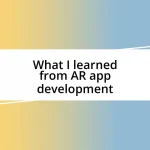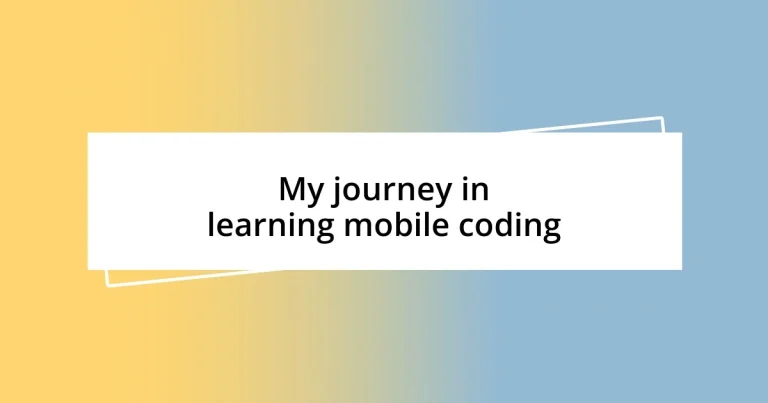Key takeaways:
- Choosing the right programming language (e.g., Swift for iOS, Java for Android) is vital and should align with project goals and community support.
- Utilizing essential tools like Android Studio and Xcode enhances coding efficiency and creativity, making app development more enjoyable.
- Engaging in practical projects and online courses reinforces learning, helps overcome challenges, and fosters a sense of community among coders.
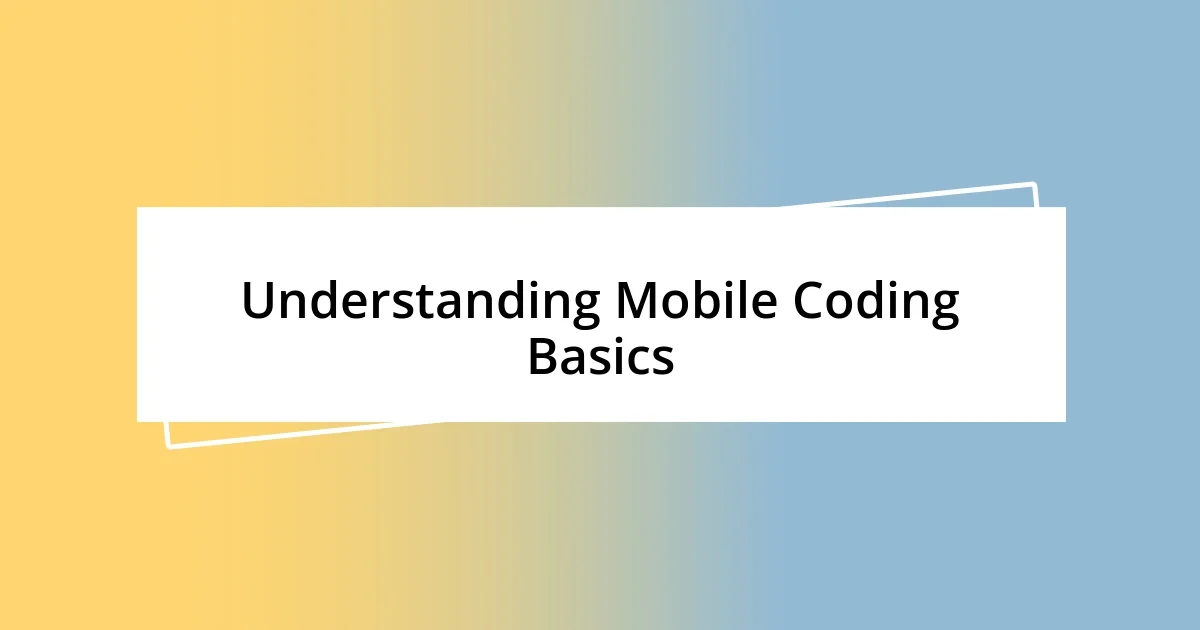
Understanding Mobile Coding Basics
Diving into mobile coding can feel overwhelming at first. I remember staring at my screen, eyes glazed over, trying to make sense of the myriad coding languages out there. Did you ever wonder how apps you use every day are built? It’s a bit like constructing a house—each line of code is a brick, and when put together correctly, they form something functional and beautiful.
Understanding the basics starts with grasping the primary programming languages, like Java and Swift. I recall my first attempt at writing an app in Java; it was both frustrating and exhilarating. It’s like trying to solve a puzzle where the pieces keep changing shape. Have you ever tinkered with code and felt that rush of excitement when everything clicks together? That’s the kind of feeling you’re aiming for in mobile coding.
As you delve deeper into this journey, don’t underestimate the importance of user interface (UI) and user experience (UX) design principles. I once spent hours refining the layout of an app, only to realize the navigation was confusing. It’s moments like these that teach you the impact of a user-friendly design. Have you thought about how interface design can influence user engagement? Trust me, those little details can make or break your app.
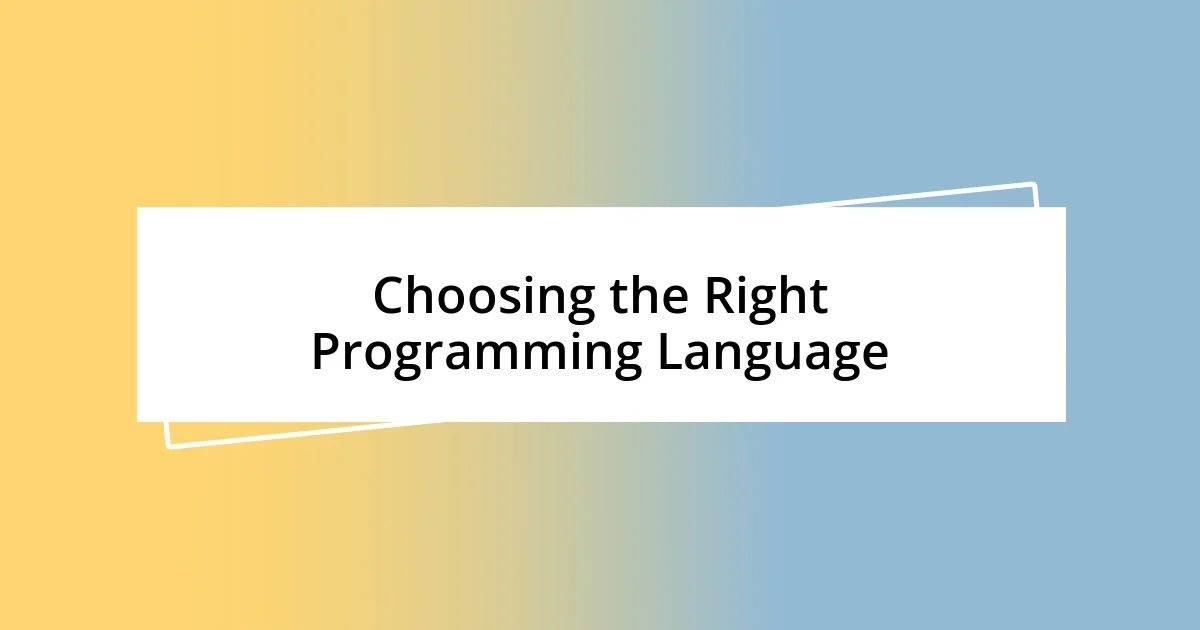
Choosing the Right Programming Language
Choosing the right programming language for mobile coding can truly feel like picking a favorite child—each has its own strengths and quirks. I remember the thrill of deciding to learn Swift for iOS development. It was like stepping into a new world, where every function felt intuitive and every error was a friendly nudge to improve. Have you ever thought about how the right language can transform your learning experience?
On the other hand, I found myself equally fascinated by Java for Android development. There’s something nostalgic about it, as I had worked with it in college and struggled at times, but now, it feels like an old friend. Each time I write Java code, I can hear that familiar clang of challenge echoing from my early days. Which language do you feel drawn to based on your aspirations?
In choosing a programming language, consider your project goals, the platform you’re targeting, and the community support available. I’ve learned that having a robust community can be a game changer; it’s like having a mentor available 24/7. The camaraderie experienced when solving a problem with others is unmatched—there’s a sense of belonging that fuels the urge to keep building.
| Language | Platform | Ease of Learning | Community Support |
|---|---|---|---|
| Swift | iOS | Easy | Strong |
| Java | Android | Moderate | Very Strong |
| JavaScript | Cross-platform | Easy | Extensive |
| Kotlin | Android | Moderate | Growing |
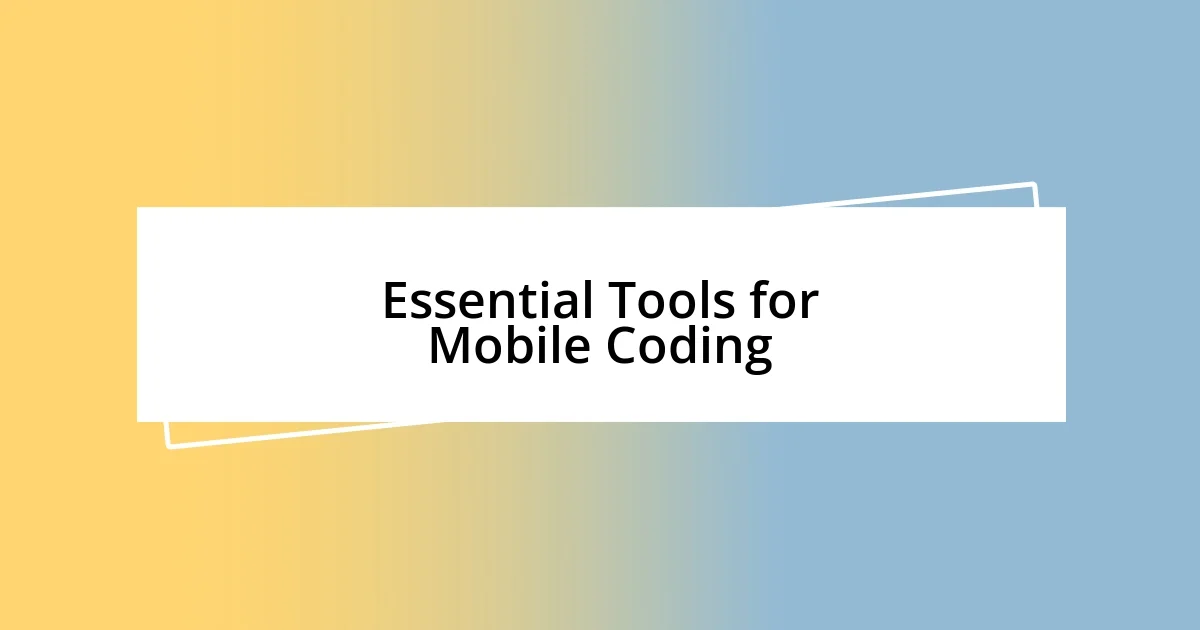
Essential Tools for Mobile Coding
When I started my mobile coding journey, the tools I chose felt utterly crucial. I vividly remember the moment I discovered Android Studio; it was like unlocking a treasure chest full of possibilities. The integrated development environment (IDE) not only made coding easier but also fun, with its live preview feature. It became my creative playground. On the iOS side, Xcode felt similarly empowering, especially with its robust debugging tools that helped me pinpoint issues I would have otherwise missed. There’s something satisfying about watching your app come to life, don’t you think?
Here are some essential tools I recommend for mobile coding:
- Android Studio: The go-to IDE for Android development, complete with a user-friendly interface and extensive features.
- Xcode: Apple’s IDE for iOS apps, featuring a host of tools for design, coding, and testing.
- Visual Studio Code: A versatile code editor perfect for multiple languages, with a rich ecosystem of extensions.
- Flutter: An open-source UI toolkit that allows you to build natively compiled applications for mobile, web, and desktop from a single codebase.
- Postman: Excellent for API testing, making it easier to build robust mobile apps that communicate seamlessly with backend services.
Each of these tools has served as a significant stepping stone in my programming path, enhancing both my efficiency and creativity. The right tools can streamline your process and catalyze your ideas into workable solutions.

Learning Resources and Online Courses
When it comes to learning mobile coding, I can’t emphasize enough how valuable online courses can be. Early on in my journey, I stumbled upon platforms like Udacity and Coursera. The structured format and expert-led videos made complex concepts digestible. Honestly, could you imagine trying to navigate coding without that kind of guidance? I certainly couldn’t!
I also found immense value in interactive platforms like Codecademy. There’s something incredibly rewarding about writing code and seeing immediate results. I still remember my excitement when I completed a challenging JavaScript module; it felt like cracking a code that had baffled me for ages. Have you ever experienced that rush of understanding after a breakthrough moment? It’s exhilarating!
For those seeking community, I highly recommend resources like freeCodeCamp. Their approach combines learning with real project experience, letting you contribute to open-source projects while honing your skills. I enjoyed collaborating with others and realizing we were all in this together, navigating the ups and downs of coding. It creates a sense of belonging that really reinforces your commitment to learning. What resources have you found that resonate with your learning style?
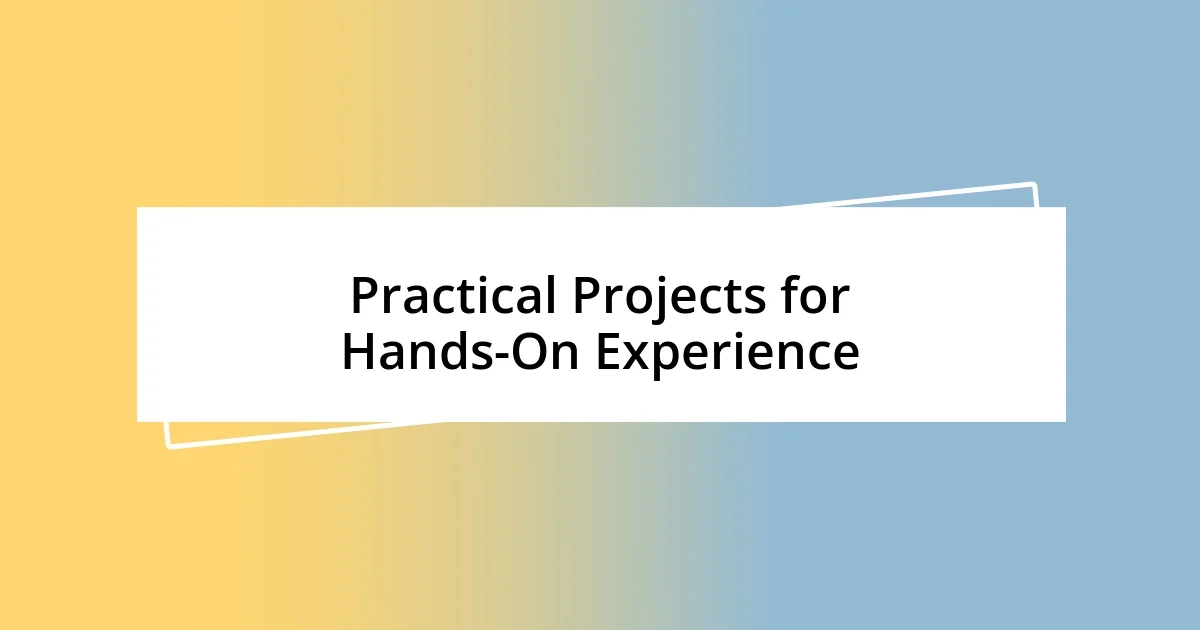
Practical Projects for Hands-On Experience
Diving into practical projects is essential for anyone serious about mobile coding. One of the first projects I tackled was a simple to-do list app. It seemed elementary at first, but as I coded, I faced real-world challenges like data persistence and UI design. These obstacles taught me invaluable lessons that no tutorial could replicate. Have you ever felt the thrill of overcoming a problem you thought was insurmountable?
I also ventured into building a weather app using an API, which was an eye-opening experience for me. Integrating real-time data involved not just coding, but also a fair amount of research to understand how APIs functioned. It was like crafting a puzzle where every piece fit together to create something functional. Seeing my app pull live weather data gave me a sense of accomplishment that was deeply satisfying. What projects have you considered that might challenge your understanding of coding?
Lastly, I found collaborating on open-source projects to be incredibly enriching. Contributing to an existing project not only helped me improve my coding skills but also taught me about version control and working in teams. I vividly remember the excitement of successfully merging my code after countless iterations and discussions with other contributors. There’s a unique joy in knowing that your work can impact a wider community. Have you thought about joining any projects where you can collaborate with fellow coders?
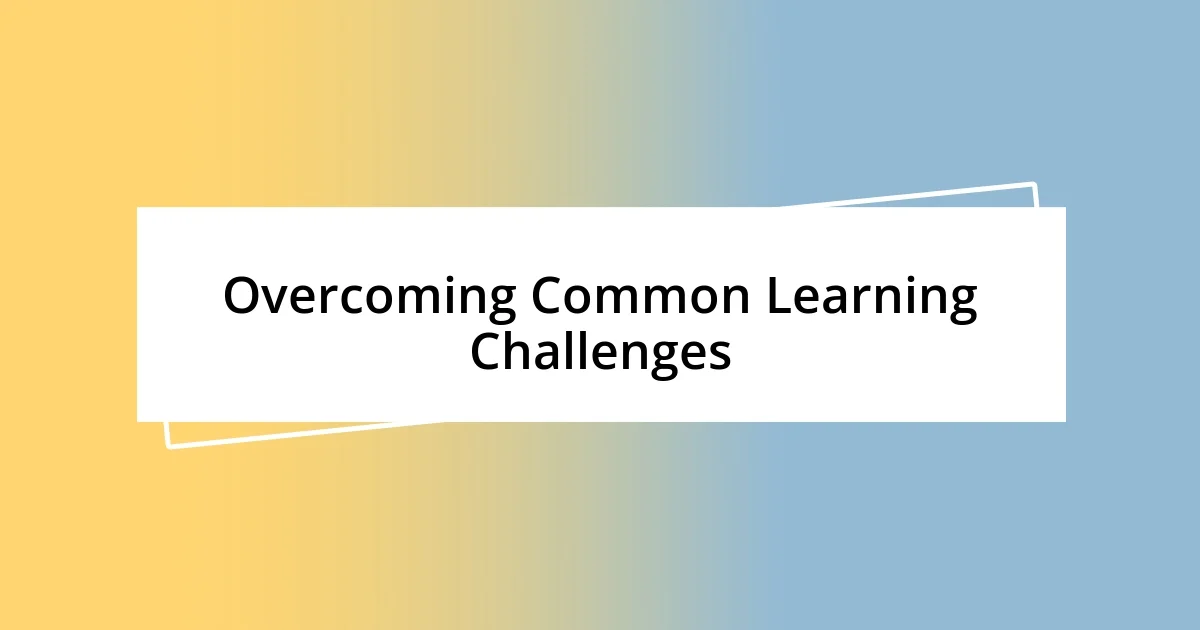
Overcoming Common Learning Challenges
When learning mobile coding, one of the biggest hurdles I faced was self-doubt, especially when I encountered complex problems. I vividly remember staring at my screen, feeling overwhelmed, convinced that I would never understand certain concepts. In those moments, reminding myself that every coder goes through similar struggles helped me push through. Have you ever found yourself questioning your abilities? What I ultimately learned is that perseverance is key.
Another challenge was finding the right balance between theory and practice. I often got lost in endless reading and tutorials, but at some point, I realized that action was just as crucial. One day, in a burst of motivation, I decided to set a timer for 30 minutes and dive into coding without distractions. It was liberating! This approach transformed my learning process; it was as if the fog of theory lifted, allowing me to see real progress. Have you tried setting a specific time for focused practice?
Lastly, managing time effectively while juggling other responsibilities was a significant learning curve for me. I started by creating a schedule to allocate specific hours for coding. At first, it felt restrictive, but soon I discovered that this structure made my learning more efficient. I can still recall those evenings when I would lose track of time, completely absorbed in a project. Have you experienced that feeling of losing yourself in coding? Using techniques like this can turn challenges into productive learning sessions.



